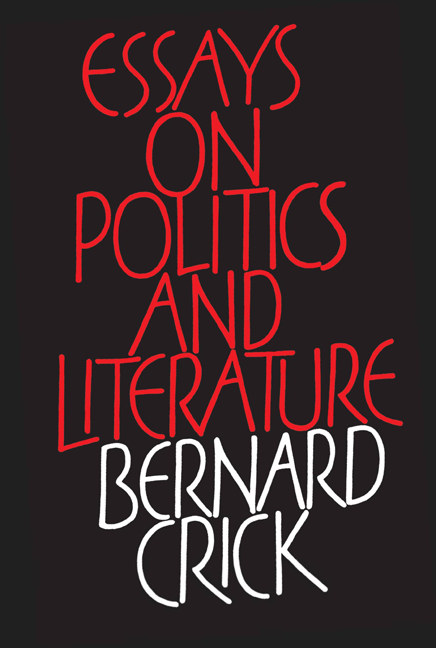Book contents
- Frontmatter
- Contents
- Preface
- Acknowledgements
- Foreword by David Daiches
- One Literature and Politics
- Two The Political in Britain’s Two National Theatres
- Three Young Writers of the Thirties
- Four Koestler’s Koestler
- Five Hannah Arendt: Hedgehog or Fox?
- Six Beatrice Webb as English Diarist
- Seven Words
- Eight My Lse
- Nine Reading The Observer as a Complex Text
- Ten On the Difficulties of Writing Biography and of Orwell’s in Particular
- Eleven Reading Nineteen Eighty-Four As Satire
- Twelve Animal Farm For Schools
- Thirteen Orwell and English Socialism
- Fourteen On the Orwell Trail
- Fifteen Wedekind’s Spring Awakening
- Sixteen Horvath’s Tales From the Vienna Woods
- Seventeen Pinter’s No Man's Land
- Eighteen Polly By Gaslight
- Nineteen Edgar Catches Jenkins’ Ear at the Barbican
- Twenty Barrault at the Barbican
- Index
Eight - My Lse
Published online by Cambridge University Press: 24 September 2020
- Frontmatter
- Contents
- Preface
- Acknowledgements
- Foreword by David Daiches
- One Literature and Politics
- Two The Political in Britain’s Two National Theatres
- Three Young Writers of the Thirties
- Four Koestler’s Koestler
- Five Hannah Arendt: Hedgehog or Fox?
- Six Beatrice Webb as English Diarist
- Seven Words
- Eight My Lse
- Nine Reading The Observer as a Complex Text
- Ten On the Difficulties of Writing Biography and of Orwell’s in Particular
- Eleven Reading Nineteen Eighty-Four As Satire
- Twelve Animal Farm For Schools
- Thirteen Orwell and English Socialism
- Fourteen On the Orwell Trail
- Fifteen Wedekind’s Spring Awakening
- Sixteen Horvath’s Tales From the Vienna Woods
- Seventeen Pinter’s No Man's Land
- Eighteen Polly By Gaslight
- Nineteen Edgar Catches Jenkins’ Ear at the Barbican
- Twenty Barrault at the Barbican
- Index
Summary
My LSE was a year or more as an inter-collegiate undergraduate student, then two years as a post-graduate student (1950-2), and then from January 1957 to June 1965 as a member of the staff. But I am only going to write about what I can now remember about what it seemed to me to be like then as a student.
So this has no pretensions to be either history or premature autobiography. True, I’ve dipped into some old files labelled ‘Student Junk’ to get some colour, but they are almost as incomplete and as idiosyncratic as memory; and from my work on Orwell's biography I’ve discovered that human memory even over twenty years is unreliable, patchy, rationalizing and imaginative unless checked point by point with the written record.
The great tradition of LSE as the Sacred College of Social Democracy, the advance guard—if not the whole army—of the social sciences in Great Britain, and of ‘the empire on which the concrete never set’ (whose joke was that really?), all that I saw later but not then. How accidental it is that any individual goes to any particular place and, I scorn teleology, to feel part of an academic tradition is always hindsight. True, I was never more pleased than when The Guardian made me part of that tradition. The back cover of the Pelican edition of my In Defence of Politics has their reviewer saying:
One of the most thoughtful products of the political dialogues of the London School of Economics since the great days of Tawney, Dalton, Wallas and Hobhouse.
Youthful ambition fulfilled? No, in fact, socialist though I was as a sixth former, I neither knew of LSE in these terms nor wished ‘above all else to go there’. It was accident. I was simply a late developer, nothing but a formidable rugby player, until I prematurely ceased to grown and did unexpectedly well at the old Matric in the Fifth Form and even better in Higher Schools, except that I stubbornly refused to pass Latin even at the lower level.
What, at such a school at Whitgift, could be done with me? A socialist sixth-form master spotted that the Economics Faculty at London required no Latin.
- Type
- Chapter
- Information
- Essays on Politics and Literature , pp. 93 - 105Publisher: Edinburgh University PressPrint publication year: 2020

